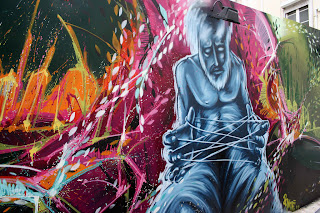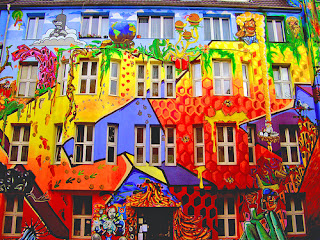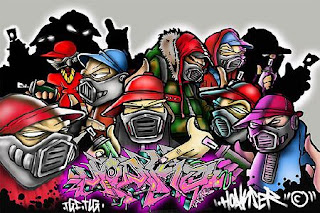Graffiti has become a common stepping stone for many members of both the art and design community in North America and abroad. Within the United States Graffiti Artists such as Mike Giant, Pursue, Rime, Noah and countless others have made careers in skateboard, apparel and shoe design for companies such as DC Shoes, Adidas, Rebel8 Osiris or Circa. Meanwhile there are many others such as DZINE, Daze, Blade, The Mac that have made the switch to gallery artists often times not even using their initial medium, spray paint. According to Marc Ecko, an urban clothing designer, who has been an advocate of graffiti as an art form; "Graffiti is without question the most powerful art movement in recent history and has been a driving inspiration throughout my career." Of course, writing and painting pictures on the walls have a long history, but creation of modern spray paints and other coloring media have given a new impetus to this activity and have even raised it to the art status. Shortly after the death of Charlie Parker the great saxophone player in Jazz scene, whose nickname was "Bird", graffiti began to appear around New York with the words "Bird Lives". In Paris, during the student protests and general strike of May 1968 graffiti slogans such as L'ennui est contre-r�volutionnaire ("Boredom is counterrevolutionary") was sprayed on the walls. In the streets of London and Paris the Iranian dissidents graffiti of "Down with the Shah" was a familiar scene during the 1970s, and in the U.S. a popular graffiti during this time was the legend "Dick Nixon Before He Dicks You".
Street artists have challenged art by situating it in non-art contexts. The Graffiti in particular is usually associated with the anti-establishment. However, the aim of graffiti or street art is not to change the definition of an artwork, but rather to question the existing environment with its own language. They attempt to have their work communicate with everyday people about socially relevant themes in ways that are informed by esthetic values without being imprisoned by them. Nevertheless, some artists have become part of the main stream. For instance, graffiti artists Lee Quinones and Fab 5 Freddy were given a gallery opening in Rome by art dealer Claudio Bruni. Fab 5 Freddy and Futura 2000 took hip hop graffiti to Paris and London as part of the New York City Rap Tour in 1983. The emergence of the new stencil graffiti genre around 1981 by graffiti artist Blek le Rat in Paris was another landmark in the recognition of this art form and by 1985 stencils had appeared in other cities including New York City, Sydney and Melbourne, where they were documented by American photographer Charles Gatewood and Australian photographer Rennie Ellis. In 1981, Washington Project for the Arts held an exhibition entitled Street Art, which included John Fekner, Fab Five Freddy and Lee Quinones working directly on the streets. Fekner, a pioneer in urban art, is included in Cedar Lewisohn�s book Street Art: The Graffiti Revolution, which accompanied the 2008 Street Art exhibition at the Tate Modern in England, of which Lewisohn was the curator.
With the popularity and legitimization of graffiti has come a level of commercialization. In 2001, computer giant IBM launched an advertising campaign in Chicago and San Francisco which involved people spray painting on sidewalks a peace symbol, a heart, and a penguin (Linux mascot), to represent "Peace, Love, and Linux." However due to illegalities some of the "street artists" were arrested and charged with vandalism, and IBM was fined more than US$120,000 for punitive and clean-up costs. In 2005, a similar ad campaign was launched by Sony and executed by TATS CRU in New York, Chicago, Atlanta, Philadelphia, Los Angeles and Miami to market its handheld PSP gaming system. In this campaign, taking notice of the legal problems of the IBM campaign, Sony paid building owners for the rights to paint on their buildings "a collection of dizzy-eyed urban kids playing with the PSP as if it were a skateboard, a paddle or a rocking horse." Keith Haring was another well-known graffiti artist who brought Pop Art and graffiti to the commercial mainstream. In the 1980s, Haring opened his first Pop Shop: a store that offered everyone access to his works�which until then could only be found spray-painted on city walls. Pop Shop offered commodities like bags and t-shirts. Haring explained that, "The Pop Shop makes my work accessible. It's about participation on a big level, the point was that we didn't want to produce things that would cheapen the art. In other words, this was still art as statement".
Blu is an Italian street artist from Bologna. His graffiti art, using spray paint appeared in 1999. He gradually developed his own distinct style with house paint. Using rollers mounted on top of telescopic sticks, he depicts monstrous degenerated characters with a dark sense of humor.
In 2004, his work was noticed by some art galleries which offered him solo-exhibitions. He has said of his work;
my painting are reflecting more than what I could say with words. Personally I try live without making violence on anyone. I see two really dangerous things in the world: fear and rage. Everyone can be easily controlled through these emotions, especially in this historical moment.
Go to the next chapter; Chapter 36 - Art of Posters for Films - the Cuban School
----
Ben Eine
Ben Flynn, his work under signature "Eine", was born in 1970 in London, England. One of London�s most prolific and interesting street artists, Eine is known for his "street typography". He started as vandal when he was fifteen, leaving his first tag all over London before eventually developing a distinct typographic style. His bright, colorful letters have been painted on the street walls around in many cities, among them Los Angels , San Francisco, Paris, Dublin, Tokyo, Stockholm and London.
Eine has exhibited at White Walls gallery in San Francisco, and his works was included in the biggest exhibition of street art to date �Art in the Streets� at the Museum of Contemporary Art (MoCA), Los Angeles. David Cameron has presented one of Eine's works to President Obama as a gift on his first official state visit. The Middlesex Street in London, which is decorated with his trademark colours and typography is described by The Times as �a street now internationally recognized as a living piece of art with direct links to The White House.�
------------------------------------------------------------------------------------
This work is licensed under a Creative Commons Attribution-No Derivative Works 3.0 Unported License.
















































.jpg)

